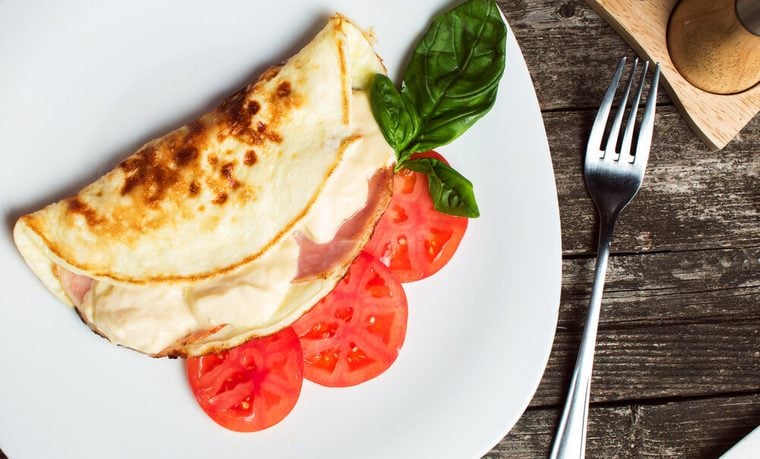This Is Why You Might Want to Stop Ordering Egg White Omelettes
Updated: Oct. 13, 2020
They aren't the health booster you thought they were.

On the “healthy” section of any breakfast menu, you’re bound to spot an egg white omelet. With no fat and just a quarter of the calories in a whole egg, the whites look like the best option at first glance. Not so fast, though—new research reveals a compelling reason you might want to keep the yolk in if you want to get fit.
In a recent study, University of Illinois Urbana-Champaign researchers had ten young men eat either whole eggs or egg whites after completing a strength-training workout. Both egg options contained 18 grams of protein, and the eggs were developed with chemical markers so the researchers could track the amino acids—building blocks of protein—during digestion. Check out these other nine non-meat sources of complete protein.
The researchers tracked how the men’s bodies used amino acids from the eggs and egg whites, and found some surprising results, published in the American Journal of Clinical Nutrition. About 65 to 70 percent of amino acids were available in the blood for both the whole egg and egg white groups, suggesting they’d be equally useful in building muscle. But the rest of the results didn’t back up that conclusion.
When the researchers looked specifically at how much protein synthesis—the process that helps muscles repair and grow—occurred, one form of egg clearly outdid the other. “The ingestion of whole eggs immediately after resistance exercise resulted in greater muscle-protein synthesis than the ingestion of egg whites,” says lead study author Nicholas Burd, PhD, professor of kinesiology and community health with the University of Illinois, in a statement. Don’t miss these other nine foods that help you build muscle.
The researchers recommend eating whole eggs over egg whites to make the best use of the protein, but they didn’t pin down why the whole eggs are more effective. Past research from Dr. Burd has shown adding fat to isolated protein doesn’t help build muscle post-workout, so it’s doubtful that the fat in the yolks is behind the benefits.
This study was too small to be conclusive, its conclusion backs up whole-egg benefits nutritionists have been touting for years. Even though egg whites are high-protein, low-calorie, protein is about all they have to offer. The yolk contains nearly all of an egg’s vitamins A, B12, and D, plus iron and calcium, so you miss important nutrients by ordering egg whites only. Find out 17 healthy breakfast mistakes you might be making.
Plus, forget the bad rap the cholesterol in yolks has gotten in the past. The USDA removed limits on dietary cholesterol in its most recent dietary guidelines because evidence doesn’t back up claims that the cholesterol you eat has much influence on blood cholesterol levels. It does note that high-cholesterol foods also tend to be high in saturated fat, but that with just two grams of saturated fat (the rest are “good” unsaturated fats), large eggs are still in the clear. Find out what the worst eating habits for high cholesterol really are.
Even if you were more worried about calories than fat, consider this: One study found that adults who eat eggs (including yolks) in the morning lose more weight and body fat than those who get the same number of calories from a bagel-based breakfast. While no large studies have investigated the weight-loss benefits of whole eggs vs. egg whites, there’s also no evidence that the 140 calories in two whole large eggs should scare you away. Crack on, egg lovers. Next, here are 27 healthy breakfast ideas you can use today.
[Source: EurekAlert!]












